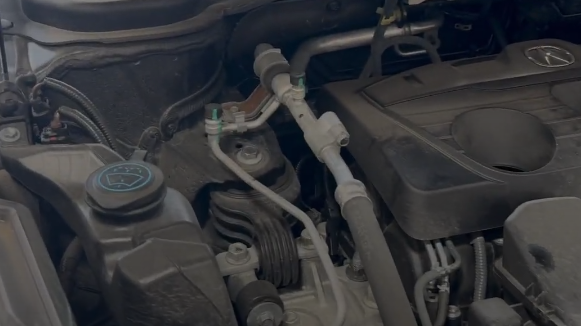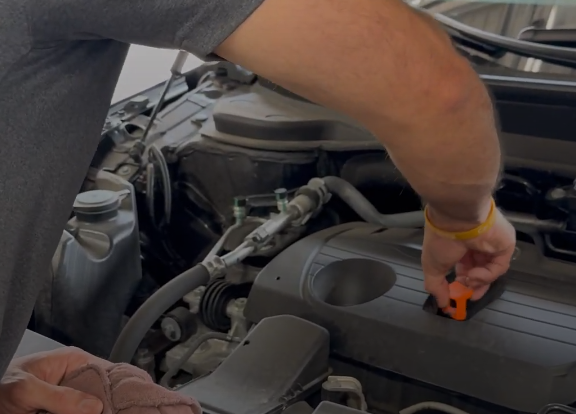Fluid Level Check: A Key Component of Vehicle Maintenance
Keep Your Car Running Smoothly
Keeping your vehicle running smoothly isn't just about changing the oil every few months. One of the most important parts of vehicle maintenance is checking the fluid levels regularly. This simple task can save you from costly repairs down the line and ensure your car performs at its best.

Key Takeaways
- Regular fluid level checks can prevent serious engine damage.
- Key fluids to monitor include engine oil, transmission fluid, brake fluid, and coolant.
- Perform fluid checks on a level surface and use the correct tools for accuracy.
- Watch for signs of low fluid levels, like warning lights and unusual noises.
- Address any fluid leaks promptly to maintain vehicle safety and performance.
Understanding The Importance Of Fluid Level Check
Why Fluid Levels Matter
Okay, so why should you even bother checking your car's fluids?
Well, think of fluids as the lifeblood of your vehicle. They keep everything running smoothly, preventing parts from grinding against each other and overheating. Ignoring fluid levels is like ignoring a slow leak in your house – it might not seem like a big deal at first, but it can lead to major problems down the road. Regular checks can save you a ton of money and stress.
Consequences Of Neglecting Fluid Checks
Let's be real, neglecting fluid checks can lead to some pretty nasty consequences. We're talking about potential engine damage, transmission failure, or brake problems. Imagine your engine seizing up on the highway or your brakes failing when you need them most. Not fun, right? Plus, these kinds of repairs can cost a fortune. It's way cheaper to spend a few minutes checking your fluids than to deal with a major breakdown.
Benefits Of Regular Fluid Monitoring
Alright, so what are the upsides of actually keeping an eye on your fluid levels? For starters, you'll extend the life of your vehicle. Regular monitoring helps you catch small problems before they turn into big ones, preventing costly repairs and keeping your car running smoothly for longer. Plus, you'll improve your car's performance and fuel efficiency. Who doesn't want to save money at the pump? It's a win-win situation.
Keeping up with fluid checks is a simple way to ensure your car stays in good shape. It's like giving your car a regular check-up to catch any potential issues early on. This proactive approach can save you from unexpected breakdowns and expensive repairs, giving you peace of mind on the road.
Key Fluids To Monitor In Your Vehicle
It's easy to forget about the different fluids that keep your car running smoothly. We're all busy, right? But ignoring these fluids can lead to some pretty serious problems down the road. So, let's talk about the key fluids you should be checking regularly.
Engine Oil
Engine oil is basically the lifeblood of your engine.
It lubricates all those moving parts, reduces friction, and helps keep things cool. Without enough oil, your engine can overheat and even seize up. Not good! Check your oil level regularly using the dipstick. Make sure you're using the right type of oil for your car, too. Your owner's manual will have that information. If you notice your car is burning through oil quickly, it might be a sign of a leak or other issue that needs attention. You can find a local
auto repair shop to help you with this.
Transmission Fluid
If you have an automatic transmission, transmission fluid is what keeps it shifting smoothly. Low or dirty transmission fluid can cause rough shifting, slipping gears, or even complete transmission failure. And trust me, transmission repairs are expensive! Checking transmission fluid can be a little trickier than checking your oil, as some cars don't have a dipstick for it. If yours does, check it regularly. The fluid should be a clear red or pink color. If it's dark or smells burnt, it's time to get it changed.
Brake Fluid
Brake fluid is what allows you to stop your car. It's a hydraulic fluid that transfers the force from your brake pedal to your brakes. Low brake fluid can mean your brakes won't work as well, which is obviously a huge safety issue.
Brake fluid should be checked regularly, and it's important to keep an eye on the level in the reservoir. If it's low, it could indicate a leak in the brake system. Also, brake fluid absorbs moisture over time, which can reduce its effectiveness. It's generally recommended to have your brake fluid flushed and replaced every couple of years.
Coolant
Coolant, also known as antifreeze, helps regulate your engine's temperature. It prevents it from overheating in the summer and freezing in the winter. Low coolant can lead to overheating, which can cause serious engine damage. Check your coolant level regularly in the coolant reservoir. Make sure you're using the right type of coolant for your car, too. And never, ever open the coolant reservoir when the engine is hot – you could get seriously burned.
Keeping an eye on these fluids is a simple way to keep your car running smoothly and avoid costly repairs. It's a small investment of time that can save you a lot of headaches (and money) in the long run.
How To Perform A Fluid Level Check
Gather Necessary Tools
Before you even pop the hood, make sure you've got everything you need. This isn't rocket science, but being prepared makes the job way easier. You'll want:
- A clean rag or paper towels: For wiping dipsticks and cleaning up any spills.
- A funnel: Makes pouring fluids much less messy.
- The right fluids: Check your owner's manual to make sure you're using the correct type for each system. Using the wrong fluid can cause serious problems.
- Gloves: Keep your hands clean and protected from chemicals.
- A flashlight: Especially helpful in dimly lit garages or at night.
Having these items on hand will streamline the process and help you avoid any frustrating mid-check interruptions. Remember, safety first – wear gloves and eye protection if you're concerned about splashes.
Step-By-Step Checking Process
Okay, time to get your hands a little dirty. Here's a general rundown of how to check the most common fluids. Keep in mind that specific steps can vary depending on your vehicle's make and model, so always consult your owner's manual for the most accurate instructions.
- Park on Level Ground: This is super important for accurate readings. A slope can throw off the fluid levels.
- Engine Oil: Locate the dipstick, usually marked with an oil can symbol. Pull it out, wipe it clean, reinsert it fully, and then pull it out again to
assess oil levels. The level should be between the minimum and maximum marks.
- Coolant: Check the coolant reservoir, not the radiator cap when the engine is hot! Look for the "min" and "max" lines on the side of the reservoir. The coolant level should be between these lines.
- Brake Fluid: The brake fluid reservoir is usually near the master cylinder. Check the level against the markings on the reservoir. If it's low, it could indicate worn brake pads or a leak.
- Transmission Fluid: This one can be a bit trickier. Some cars have a dipstick for the transmission fluid, while others don't. If there's a dipstick, the process is similar to checking the engine oil. Make sure the engine is warmed up and running before checking. If your car doesn't have a dipstick, you'll likely need to take it to a mechanic to have the fluid level checked.
Remember, if you notice any unusual colors or smells, it's a sign that something might be wrong. Dark or gritty fluids should be addressed by a professional.
Common Mistakes To Avoid
Even though checking fluid levels is pretty straightforward, it's easy to make mistakes. Here are a few common pitfalls to watch out for:
- Checking fluids on uneven ground: As mentioned before, this can lead to inaccurate readings.
- Using the wrong type of fluid: Always double-check your owner's manual to ensure you're using the correct fluid for each system. Using the wrong fluid can cause serious damage.
- Overfilling: Too much fluid can be just as bad as too little. Stick to the recommended levels.
- Not cleaning the dipstick: A dirty dipstick can give you a false reading.
- Ignoring leaks: If you notice any leaks, address them promptly. Leaks can lead to low fluid levels and potential damage.
By avoiding these common mistakes, you can ensure that you're getting accurate readings and keeping your vehicle in top condition. If you're unsure about anything, it's always best to
contact a professional for assistance.
Signs That Fluid Levels Are Low
Warning Lights On Dashboard
Okay, so your car's dashboard is basically trying to talk to you. When those little lights pop on, especially the ones shaped like an oil can or a thermometer, pay attention!
These are often the first indicators that something's up with your fluid levels. Ignoring them is like ignoring a screaming baby – it's only going to get worse. It could be something as simple as needing to top off your coolant, or it could signal a bigger problem, like a leak. Either way, don't just dismiss it. Get it checked out. It's way cheaper than dealing with a blown engine or seized brakes.
Unusual Noises From The Engine
Engines aren't usually chatty, so when they start making weird noises, it's a red flag. A whining sound could mean your power steering fluid is low, making the pump work harder. Clunking or banging? That could be your engine oil struggling to lubricate everything properly. And a hissing sound might point to a coolant leak. Basically, any new or strange noise coming from under the hood is worth investigating. It's like your car is sending you an SOS signal, and you need to be the one to decode it. If you hear something off, don't just crank up the radio and hope it goes away. Get it looked at by a mechanic.
Poor Vehicle Performance
Is your car feeling sluggish? Maybe it's struggling to accelerate, or the gears are shifting rough. These could be signs of low fluid levels. For example, if your
transmission fluid is low, you might notice the car hesitating or jerking when it shifts. Low engine oil can also lead to reduced power and fuel efficiency. And if your brake fluid is low, well, that's a serious safety issue – you might experience longer stopping distances or a spongy brake pedal.
Think of your car's fluids as its lifeblood. When they're low, the whole system suffers. It's like trying to run a marathon on an empty stomach – you're just not going to perform at your best. So, pay attention to how your car is driving. If it feels different, there's probably a reason.
Best Practices For Fluid Maintenance
Regular Inspection Schedule
Okay, so you know you should check your fluids, but how often is often enough? Well, it depends.
A good rule of thumb is to check your fluid levels at least once a month. However, if you do a lot of driving, especially in tough conditions like stop-and-go traffic or extreme weather, you might want to bump that up to every other week. Set a reminder on your phone or mark it on your calendar – whatever works to keep you on track. Regular checks can help you catch small problems before they turn into big, expensive ones. For example, you can check your
motor oil monthly to ensure optimal performance.
Using Manufacturer-Approved Fluids
This is a big one. Don't skimp on fluids! Your car's manufacturer has specific recommendations for the types of fluids your vehicle needs. Using the wrong fluid can cause serious damage to your engine, transmission, or other components. Always check your owner's manual to see what specifications are required, and stick to those. Sure, the cheap stuff at the auto parts store might seem tempting, but it's not worth the risk. Think of it like this: you wouldn't put just any kind of gas in your car, would you? Same goes for fluids.
Addressing Leaks Promptly
Leaks are bad news. If you notice a puddle of fluid under your car, don't ignore it! Figure out what's leaking and get it fixed ASAP. Even a small leak can lead to big problems if left unchecked. Low fluid levels can cause your engine to overheat, your transmission to fail, or your brakes to stop working properly. Plus, leaking fluids are bad for the environment. So, if you see a leak, take your car to a mechanic and get it diagnosed. It's better to be safe than sorry. Remember to check your transmission fluid every 30,000 to 60,000 miles.
Ignoring a leak is like ignoring a toothache. It might not seem like a big deal at first, but it will only get worse over time. And just like with your teeth, the longer you wait, the more expensive and painful the fix will be.
The Role Of Professional Assistance
Sometimes, you just need a pro. I mean, we can all try to
check car fluids ourselves, and that's great for regular maintenance. But there are times when it's smarter to call in someone who really knows their stuff. Let's be real, messing with your car's fluids can get tricky, and sometimes you need that extra set of experienced eyes.
When To Seek Help
Okay, so when should you actually consider getting a mechanic involved? Well, if you're seeing warning lights pop up on your dashboard constantly, that's a big red flag. Also, if you notice weird noises coming from under the hood, don't ignore them! And if your car just isn't performing like it used to – maybe it's sluggish or feels rough – it's time to get it checked out.
Basically, any major change in your car's behavior warrants a visit to a professional. If you're not comfortable doing the fluid checks yourself, or if you suspect a leak but can't find it, a mechanic can diagnose the problem accurately.
Benefits Of Professional Fluid Checks
Why bother paying someone to do something you could potentially do yourself? Well, for starters, mechanics have the right tools and equipment. They can spot problems that you might miss, like tiny leaks or early signs of wear and tear. Plus, they know exactly what kind of fluids your car needs and how much.
- Accurate diagnosis of issues
- Proper fluid replacement
- Prevention of future problems
Getting a professional fluid check can save you money in the long run by preventing bigger, more expensive repairs down the road. It's like getting a regular check-up at the doctor – it's all about preventative care.
Choosing The Right Mechanic
Finding a good mechanic is like finding a good doctor – you want someone you can trust. Start by asking friends and family for recommendations. Read online reviews and check for certifications. A mechanic with ASE (Automotive Service Excellence) certification has proven their knowledge and skills. Don't be afraid to ask questions about their experience and their approach to fixing your car. And always, always get a written estimate before they start any work. This helps avoid surprises later on. Look for a shop that specializes in your car's make or model, as they'll likely have more experience with its specific quirks.
Impact Of Weather On Fluid Levels
Effects Of Extreme Temperatures
Weather can really mess with your car's fluids. Think about it: scorching summers and freezing winters put a lot of stress on everything. Extreme heat can cause fluids to evaporate faster, especially coolant and even oil if it's old. This means you might find yourself topping things off more often than usual. On the flip side, cold weather can thicken fluids, making it harder for them to do their job properly.
This is especially true for your engine oil and transmission fluid.
Seasonal Maintenance Tips
Okay, so what can you actually do about all this? Well, a little seasonal prep goes a long way. Here's the deal:
- Spring: Time for a general check-up. Make sure to inspect all fluid levels after the winter. Check for any leaks that might have developed due to the cold. Replace windshield washer fluid with a summer formula that's good for bug removal.
- Summer: Keep an eye on your coolant level. Overheating is a real risk in the summer, so make sure your cooling system is up to the task. Consider using a higher-viscosity oil if you live in a super hot climate.
- Fall: Get ready for winter! Check your antifreeze levels to make sure they're adequate for the expected temperatures. Switch to winter windshield washer fluid that won't freeze.
- Winter: Check your tire pressure regularly, as it drops in cold weather. Make sure your battery is in good shape, as cold weather can weaken it. Keep an eye on all fluid levels, especially if you're driving in snowy or icy conditions.
It's a good idea to keep a small container of each type of fluid in your car, especially during extreme weather. That way, if you notice a low level, you can top it off right away. Just make sure to store them properly to avoid spills.
Adjusting Fluid Levels For Weather Changes
Sometimes, you might need to tweak your fluid levels a bit depending on the weather. For example, if you're heading into a really cold snap, you might want to add a bit more antifreeze to your coolant mix to prevent freezing. Or, if you're expecting a heat wave, you might want to make sure your coolant is topped off to the maximum level to help prevent overheating.
Wrapping It Up: The Importance of Fluid Checks
So, there you have it. Keeping an eye on your vehicle's fluid levels is a big deal. It’s not just about avoiding breakdowns; it’s about making sure your car runs smoothly and lasts longer. Regular checks can save you from costly repairs down the line. Plus, it’s pretty easy to do. Just remember to check those levels often and stick to the right fluids for your car. If you’re ever unsure, don’t hesitate to ask a pro for help. Your car will thank you for it.
Frequently Asked Questions
Why is checking fluid levels important for my car?
Checking fluid levels is important because it helps prevent engine problems and breakdowns. If fluids are too low, it can cause serious damage to your vehicle.
How often should I check my car's fluids?
You should check your car's fluids at least once a month or before long trips to ensure everything is at the right level.
What are the main fluids I need to check in my vehicle?
The main fluids to check include engine oil, transmission fluid, brake fluid, and coolant.
What should I do if I notice a fluid leak?
If you see a fluid leak, you should have your car checked by a mechanic as soon as possible. Leaks can lead to bigger problems.
Can I use any type of fluid for my car?
No, you should only use fluids that meet your vehicle's specifications. Check your owner's manual for the right types.
What signs indicate that my fluid levels might be low?
Signs of low fluid levels include warning lights on the dashboard, unusual noises from the engine, and poor vehicle performance.












